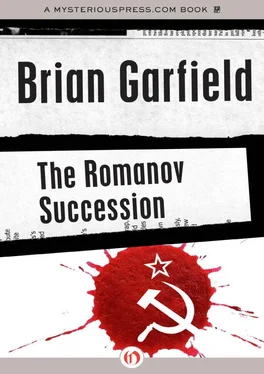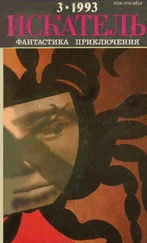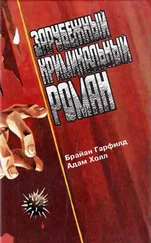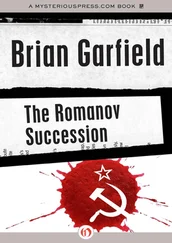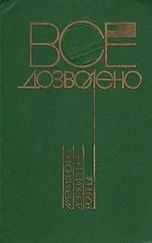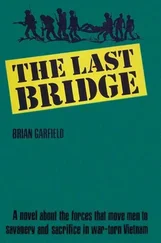Ludicrously it put him in mind of something Carol Ann had said: “Sometimes there’s not a damn thing you can do but act like a jackrabbit in a hailstorm: hunker down and take it.”
The locomotive made a minimal target head-on at six hundred yards; half a degree’s error and the tank gun’s shells exploded harmlessly in the snow. It looked an easy shot but it wasn’t. At fifty miles an hour—possibly more—the solitary 2-6-2 locomotive was cutting the range faster than the tanks’ gunners could crank their elevation gear and there was just enough curve in the long bend of the track to force the guns to keep correcting their traverse aim.
It was absurd to hide behind the thin plate of the engine’s rear armor but they did it out of instinct, five of them crowded into that little space and several more crouching on the plow blade behind the engine. Alex kept his eyes up far enough to see but there was nothing he could do but wait. And if the fire went out under the boiler right now it would be all over.
You could see the shell come out of the muzzle or at least the exploding smoke that propelled it. You could hear them come in: overhead with a roar or to one side with a deafening crash. All three tanks were shooting as fast as they could load but the outboard ones weren’t coming anywhere close. Then a shell that must have been HE blew up a hundred feet in front of him and his breath caught in his throat because it looked as though it had blown the roadbed apart but it must have been off to the side just enough: it had dumped gravel and ice on the rails and the locomotive lurched and rattled under him but it didn’t lose its grip on the steel and they were still speeding down the track with the blown-up snow cascading over their shoulders.
When they came out of it the tank was still astraddle the rails, still shooting. Five hundred yards—at fifty miles an hour that gave them about twenty seconds and then collision.
A shout of alarm: a soldier clinging to the step. He was pointing back along the engine—up toward the crest behind them. Alex wheeled to risk a half-second’s glance.
There was a train—coming down the track in pursuit. Its open flatcars bristled with artillery. A mile or more behind. He had time to see that much and then the locomotive bucked and pitched and he heard a tremendous ringing clang that all but ruptured his eardrums. The impact threw him flat against the armor plate.
He thought for an instant they’d collided with the tank but reasoned second thought quickly discarded that: hit the tank and they’d all have been dead.
They were still rolling.
He had a painful bruise along his left shoulder where he’d slammed into the plating. Above him the armored roof of the driver’s cabin had been buckled by a tremendous blow.
Not a direct hit. A 70mm would have torn right through it and ruptured the boiler.
He leaned quickly outboard. Then he saw it. A shell had taken the smokestack right off. Shrapnel had dented the roof. He saw the sprawled bodies of six of his men back along the railway where the concussion had knocked them off the plow blade. The pursuing gun train was still there—gaining.
And when he wheeled forward there was a point-blank four-hundred-yard stretch between him and that Soviet tank and the cleats were flashing. The tank was making its turn: giving in.
Ponderously the tank clattered across the rails and it didn’t look like there’d be time for it to get clear and he watched bleakly because he couldn’t do anything else. The tankers opened up with their machine guns now because the range was down to that. On the locomotive the mortar kept chugging and its missiles made spouts and sprays in the snow. An armor-piercing round from a tank gun drilled into the ground just ahead and when it blew it shot a fountain of whistling rocks and snow across the tracks; he ducked and heard Sergei’s dry grunt amid the racket of junk raining on the twisted steel roof.
They came out of that into daylight within a hundred yards of the tank and it was still crawling, trying to get off the rails, skidding on the snow. One tread was still on the ties. There was an unrelenting cacaphony of artillery and small arms and the machine-gun bullets clanged along the steel surfaces of the locomotive. One voice cried out and the cry was cut off definitely in its middle. Alex distinguished the separate sound of tommyguns being fired by his own men on the sides of the locomotive—useless angry fusillades at the impassive tanks—and one by one those guns went silent: out of ammunition or shot off the train by the tanks’ wickedly traversing machine guns. About two seconds left now and he braced himself, wedged between Sergei’s big shoulder and a corner of the armored backplate; they would hit the tank or they would not hit it— now.
It was a glancing collision but it tumbled Sergei against him and knocked the air out of him and it tipped the locomotive up on one side with all the wheels of its left side clear off the rail. It came back down onto the tracks with a fifty-ton blow that seemed to shake his teeth loose: he was sure the roadbed couldn’t withstand that punishment but somehow the locomotive was still rolling—speed down to forty now with the boiler cooling—and he crawled to the side of the platform and saw that the tremendous inertial blow had slammed the T-34 right over on its side like a helpless turtle. While he watched the tank skidded and spun across the snow and smashed into its companion tank.
There was one of them left on the far side of the track and its turret was swiveling but the track took him on around the bend before the turret gun had time to home its aim; then there was forest and the tanks were out of sight. One lobbed a shell over the trees but it burst harmlessly in the forest beyond him.
He crawled to his feet on the lurching steel deck and spoke harshly to Sergei:
“Head count.”
The collision had knocked the mortar away and the mortarman with it. There had been seventeen of them in the commando; there were five now. Sergei reported it bitterly.
The locomotive was losing speed and there was a train pursuing and he still had a responsibility to these four as great as it had been to the sixteen: that and a responsibility to survive because they’d been betrayed and vengeance for that must be exacted.
He looked at them: Sergei and the three Russian soldiers: Tukschev, Blucherov, Voroshnikov with blood on the left side of his face because something had taken off his earlobe and left a raw streak down his cheek.
Ahead of them the rails ran straight down a steady incline two miles or more through the forest. The bend was behind them and pursuit out of sight. “Go on,” he said. “Jump.”
He watched them tumble and then he went off last: thirty miles an hour perhaps; if you could put down in a parachute without breaking a leg you could jump off a train at that speed. They carried their tommy guns into the forest and began to run for it.
A heavy brownish sky hung over the horizon. Alex stood up slowly and heavily like a bear breaking water to wade up on shore. He moved his face from left to right.
Beneath the tall snow-heavy trees was a compound of buildings: the dacha and its outbuildings. Alex made a survey with his eyes and ears. Nothing stirred. He made a brief hand signal and sculled forward on his elbows. Right at the last row of trees he halted them.
He didn’t see any sign of Solov or Postsev or any of the others. Then he heard something: the distant measured rumor of an engine growling in low gear.
Sergei thrust his lower jaw forward to bite at his upper lip; he unslung his machine pistol. Alex shook his head mutely. They bellied down in the forest and the sun obscured itself behind festering clouds. He went numb with cold. The grinding racket approached steadily. When he looked at Sergei the old man’s lips were cracked and ready to bleed and so were his eyes.
Читать дальше
